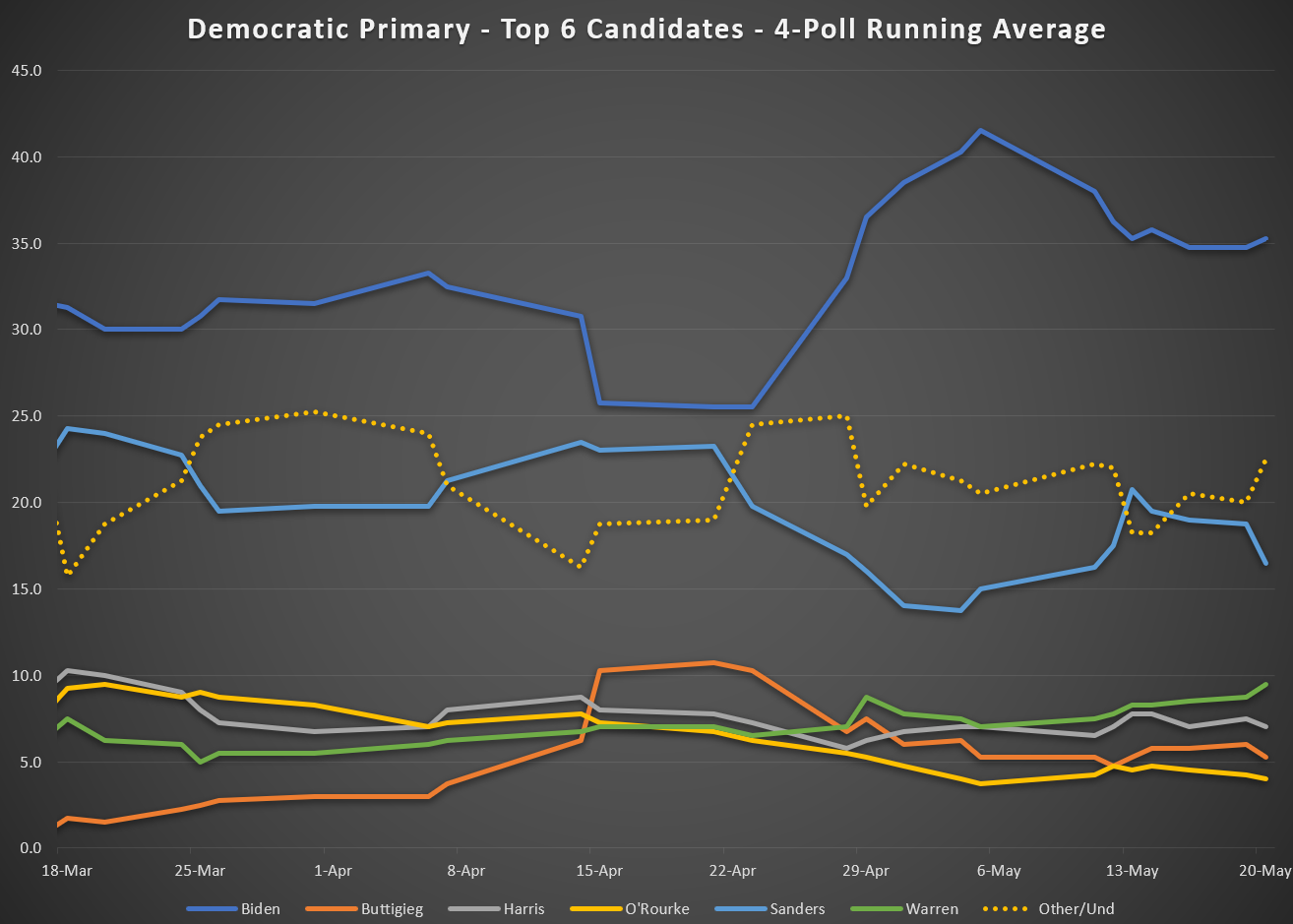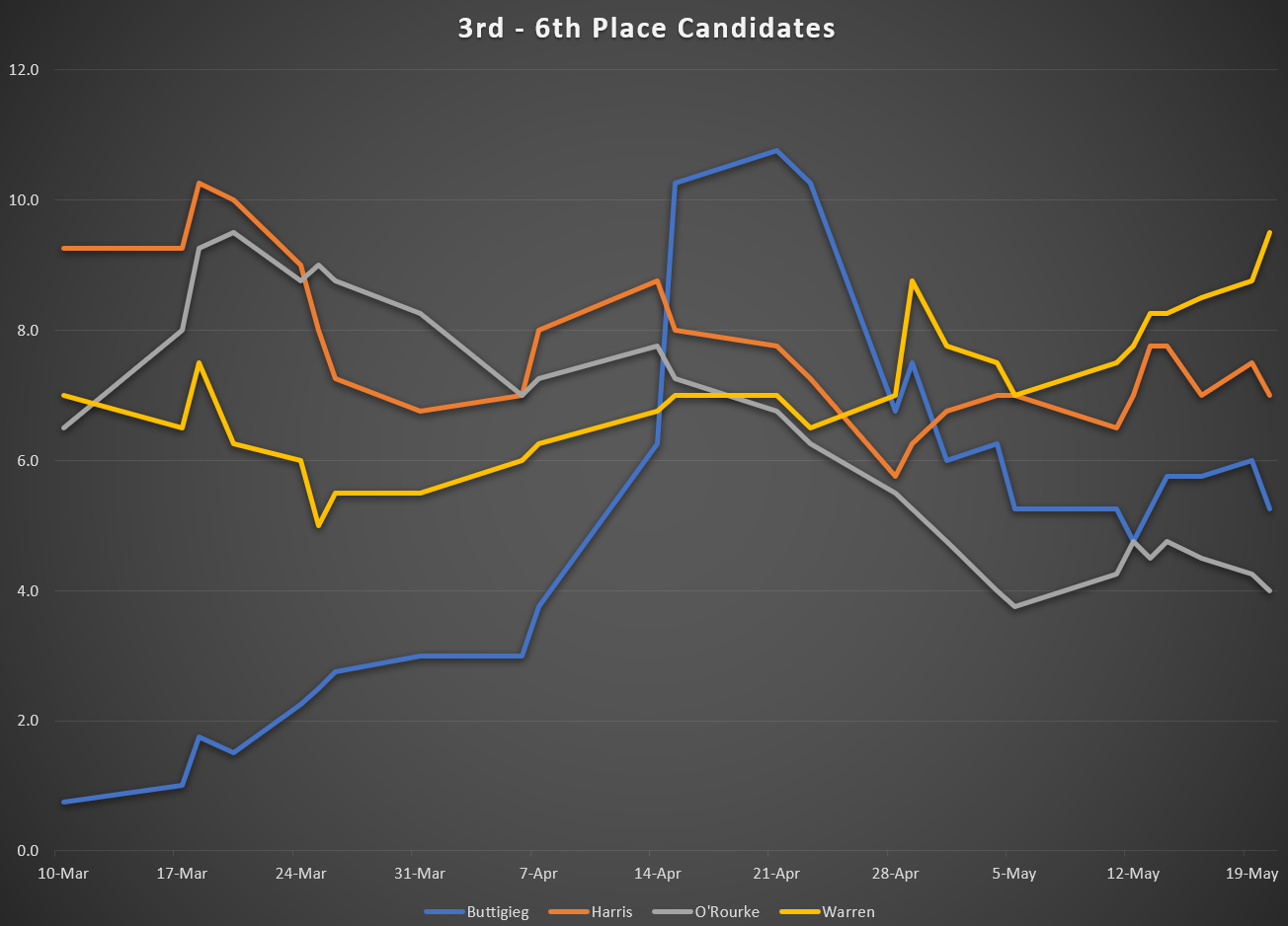I’ve been maintaining a spreadsheet generating a graph from a running average of the Democratic primary candidates since March. This is the first time I’ll be rolling this out in any detail, so I want to take a step back first and explain my rationale for my approach.
But first, a quick summary of where the candidates stand:
- Biden – 35-38% – Trending ↗↘
- Sanders – 16-21% – Trending ↘
- Warren – 8-10% – Trending ↗
- Harris – 7-8% – Trending ↘
- Buttigieg – 5-6% – Trending ↘
- O’Rourke – 4-5% – Trending ↘
My sheet incorporates a total of 40 polls conducted by a dozen or so polling outfits utilizing a variety of methodologies (landline + cell, landline, long-term online tracking polls, etc.). The nice thing about taking an aggregation is that it tends to average out discrepancies arising from differing methodologies, outliers, and so on. There have been a couple polls that have been hotly debated due to allegations of overly small sample sizes, bias, and other perceived flaws. Aggregating polls does away with that concern. It’s like a jambalaya, you just throw it all in and see what ya get.
After a bit of tuning, I’ve settled on a running average generated from an average of the most recent 4 polls. Occasionally this is manually tweaked to avoid having same-day increases or decreases (which would appear in the form of perfectly vertical up or down trends).
Let’s take a look at what we’ve got so far, and I’ll explain some stuff I’m seeing.
 First Place: Biden has been the strongest candidate since well before he officially announced his candidacy on April 25th. His announcement was marked in the polls by a bounce from about 25 points all the way up to over 40, before settling back down to around 35 points, a titch higher than his average just before the week-long lull immediately prior to his announcement.
First Place: Biden has been the strongest candidate since well before he officially announced his candidacy on April 25th. His announcement was marked in the polls by a bounce from about 25 points all the way up to over 40, before settling back down to around 35 points, a titch higher than his average just before the week-long lull immediately prior to his announcement.
Second Place: Sanders has shown a great deal of consistency for as long as Biden has. He hasn’t been able to challenge Biden’s position as front runner, but nobody else has been able to challenge Sanders. He’s been running in an unchallenged channel between about 14 and 23 points of support. However, he has been looking a little weak of late, with his support trending back towards that 15 point mark. I think if he gets much weaker, another candidate (likely Warren) will make a move.
Before I get to the rest of the candidates, it’s probably important to explain why you don’t see a bunch of candidates you might expect to see.
There are 23 candidates. Senators like Klobuchar and Gillibrand, upstarts like Yang… Why am I only showing 6 candidates?
Since I started tracking polls in March, I’ve been winnowing the field down. I’ve developed a rule of thumb for whether someone merits tracking: maintaining an average of 4+ points. Gillibrand, Gabbard, and Castro succumbed to my mercilessness first, and were soon followed by Klobuchar, as they haven’t been able to maintain an average of 2 points. Booker got cut in April (his average over the last couple weeks is around 2.5 points), and right now, O’Rourke is in serious danger of getting the axe. His average over the last month is 4.4 points, and in my running average he’s right at 4 points.
But there are many, many even weaker candidates. For perspective, the sum of the average polling for the 7th through 23rd place candidates, plus undecided voters (as shown by the dotted line above) is currently about 25 percentage points. That’s not a lot to go around. As an analyst at FiveThirtyEight pointed out, “We’ve reached the point in the Dem pres primary where more candidates (12) got 0 or less than 0.5% support than candidates who got at least 1% (11) — from a new Quinnipiac poll.”
I’m not saying that one of the dozen or so candidates running between 0 and 2 points can’t make a surge. I’m just saying that I’m not going to bother tracking them until their polling warrants it. There’s not a whole lot of purpose in having a dozen bumpy lines running across the bottom of the chart, creating a meaningless, sad-looking rainbow. That being said…
Let’s take a look at the 3rd through 6th place candidates to see who might make a move.
 The above chart shows only the 3rd through 6th place candidates, in order to better show their movement over the past two months.
The above chart shows only the 3rd through 6th place candidates, in order to better show their movement over the past two months.
Third place: Warren has been hanging in there, despite a while stuck in 5th and even 6th place. At the end of April she made a strong push, and now looks to be potentially establishing a strong position in 3rd place. She’s the only candidate I’ve seen making a steady improvement over the last month, without surrendering progress (which Biden has to some degree). Currently, I think Warren has the best chance of supplanting Sanders, as some recent polling has shown her as the most popular candidate among liberal Democrats. In two of her last five polls, she’s been in double digits, with the most recent poll released today by Quinnipiac having her at 13%, a high water mark for her. As I noted, Sanders has been looking a little weak, and if his position weakens much more, I think Sanders fans will really start peeling off towards Warren.
Fourth place: Harris has been doing a decent job as well, but one of the challenges she faces as a somewhat more moderate Democrat is that her prime opposition, Biden, is stronger than Sanders is compared to Warren. Another problem is that in Iowa, New Hampshire and Nevada, the first 3 states to vote in the primary, Warren is polling a little stronger than Harris. She has a lot working against her right now.
Fifth Place: Buttigieg-mentum is looking tapped out. Since peaking above 10 points, he’s now at about 5. There are arguments that he’s struggled to thread the needle between being the progressive appeal of being a gay candidate and the conservative appeal of his oft-discussed Christian faith. Regardless of the cause, he’s flagging.
Sixth Place: O’Rourke… LOL. Apparently things have gotten to the point where competitors and journalists aren’t bothering to look for opposition research (“oppo”) on him anymore. He doesn’t really have anything to distinguish him, and it shows. I suspect that Booker or Klobuchar may soon supplant him for sixth place, as I think they have access to better funding. But we’ll see.